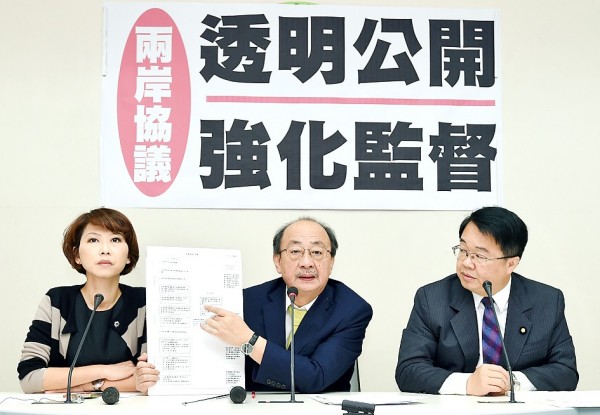《TAIPEI TIMES 焦點》 DPP unveils draft bill on cross-strait talks

Democratic Progressive Party caucus whip Ker Chien-ming, center, holds up a proposed cross-strait agreement oversight bill in Taipei yesterday. Photo: Liao Chen-huei, Taipei Times
By Loa Iok-sin / Staff reporter
The Democratic Progressive Party (DPP) caucus yesterday released a draft bill on monitoring cross-strait negotiations and agreements — without a clause that would let an agreement come into effect automatically if the review process stalls.
After meeting for more than two hours, DPP caucus members decided on a proposal for a bill to monitor cross-strait exchanges that would allow the legislature to intervene before, during and after a cross-strait negotiation and the signing of a cross-strait deal.
“After thorough discussions at the caucus meeting, [caucus members] have reached an agreement on a version [of the bill to monitor cross-strait talks and agreements] that would give the legislature the authority to intervene before, during and after negotiations,” DPP caucus whip Ker Chien-ming (柯建銘) told a news conference in Taipei following the meeting. “This is a mechanism that we have never had in the past.”
Ker said that according to the proposal, the executive branch must report to the legislature prior to any negotiations with a detailed negotiation plan, including national security checks and the effect negotiations could have.
During talks, the proposal would require the government to report to the legislature when the two sides reach an initial consensus or would like to implement major changes to a proposal, with the talks only being able to resume with the legislature’s consent, Ker said.
“The most important part of the proposal is that a draft agreement must undergo a clause-by-clause review by the legislature,” he said.
Following talks, the government should report the outcome to the legislature and the negotiations can be stopped if there are any problems, he added. “In other words, the executive branch must have the authorization of the legislature for any phase of negotiations and before signing an agreement.”
A clause saying the legislature would have up to 90 days to review a draft agreement and 30 days for a signed agreement, with a possible extension of 10 days — but if the legislature fails to approve the deal by the deadline the agreement would automatically take effect — did not appear in the final draft.
The clause was dubbed the “Chang Ching-chung clause,” because former Chinese Nationalist Party (KMT) legislator Chang Ching-chung (張慶忠) had insisted that the cross-strait service trade agreement should automatically take effect according to the Act Governing the Exercise of Legislative Power (立法院職權行使法) after it sat idle at the legislature for three months.
The DPP boycotted a review of the agreement in 2014.
When asked about the clause, DPP caucus secretary-general Chen Ting-fei (陳亭妃) denied it had been “removed,” because “there was never a Chang Ching-chung clause.”
Caucus members “made different proposals and some of those never made it to the final phase, why would there be any controversy?” Chen said.
新聞來源:TAIPEI TIMES
















